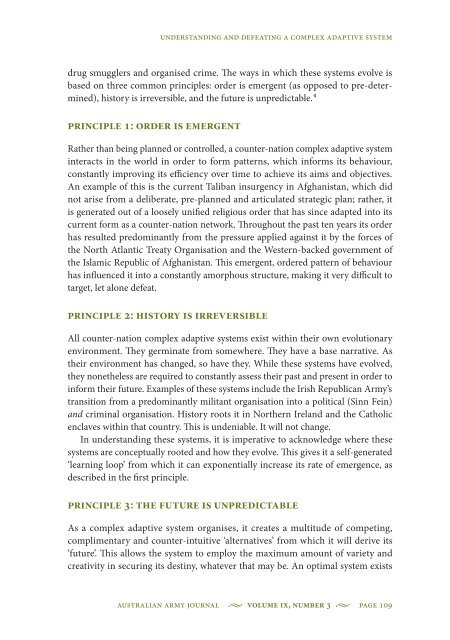Understanding and Defeating a Complex Adaptive ... - Australian Army
Understanding and Defeating a Complex Adaptive ... - Australian Army
Understanding and Defeating a Complex Adaptive ... - Australian Army
Create successful ePaper yourself
Turn your PDF publications into a flip-book with our unique Google optimized e-Paper software.
<strong>Underst<strong>and</strong>ing</strong> <strong>and</strong> <strong>Defeating</strong> a <strong>Complex</strong> <strong>Adaptive</strong> System<br />
drug smugglers <strong>and</strong> organised crime. The ways in which these systems evolve is<br />
based on three common principles: order is emergent (as opposed to pre-determined),<br />
history is irreversible, <strong>and</strong> the future is unpredictable. 4<br />
Principle 1: Order is emergent<br />
Rather than being planned or controlled, a counter-nation complex adaptive system<br />
interacts in the world in order to form patterns, which informs its behaviour,<br />
constantly improving its efficiency over time to achieve its aims <strong>and</strong> objectives.<br />
An example of this is the current Taliban insurgency in Afghanistan, which did<br />
not arise from a deliberate, pre-planned <strong>and</strong> articulated strategic plan; rather, it<br />
is generated out of a loosely unified religious order that has since adapted into its<br />
current form as a counter-nation network. Throughout the past ten years its order<br />
has resulted predominantly from the pressure applied against it by the forces of<br />
the North Atlantic Treaty Organisation <strong>and</strong> the Western-backed government of<br />
the Islamic Republic of Afghanistan. This emergent, ordered pattern of behaviour<br />
has influenced it into a constantly amorphous structure, making it very difficult to<br />
target, let alone defeat.<br />
Principle 2: History is irreversible<br />
All counter-nation complex adaptive systems exist within their own evolutionary<br />
environment. They germinate from somewhere. They have a base narrative. As<br />
their environment has changed, so have they. While these systems have evolved,<br />
they nonetheless are required to constantly assess their past <strong>and</strong> present in order to<br />
inform their future. Examples of these systems include the Irish Republican <strong>Army</strong>’s<br />
transition from a predominantly militant organisation into a political (Sinn Fein)<br />
<strong>and</strong> criminal organisation. History roots it in Northern Irel<strong>and</strong> <strong>and</strong> the Catholic<br />
enclaves within that country. This is undeniable. It will not change.<br />
In underst<strong>and</strong>ing these systems, it is imperative to acknowledge where these<br />
systems are conceptually rooted <strong>and</strong> how they evolve. This gives it a self-generated<br />
‘learning loop’ from which it can exponentially increase its rate of emergence, as<br />
described in the first principle.<br />
Principle 3: The future is unpredictable<br />
As a complex adaptive system organises, it creates a multitude of competing,<br />
complimentary <strong>and</strong> counter-intuitive ‘alternatives’ from which it will derive its<br />
‘future’. This allows the system to employ the maximum amount of variety <strong>and</strong><br />
creativity in securing its destiny, whatever that may be. An optimal system exists<br />
<strong>Australian</strong> <strong>Army</strong> Journal • Volume IX, Number 3 • page 109

















